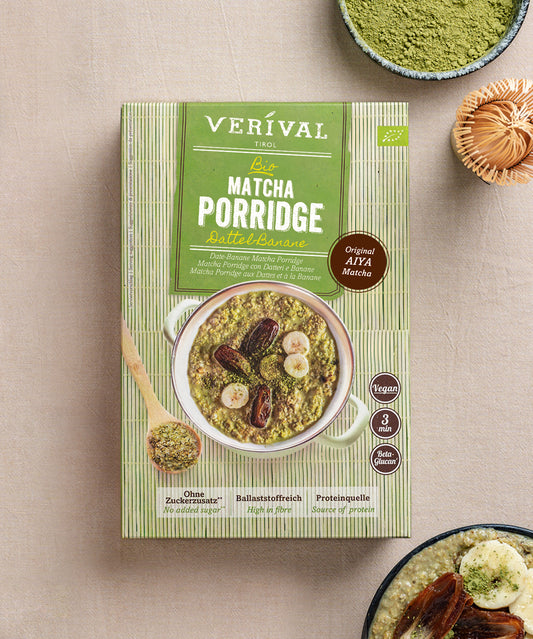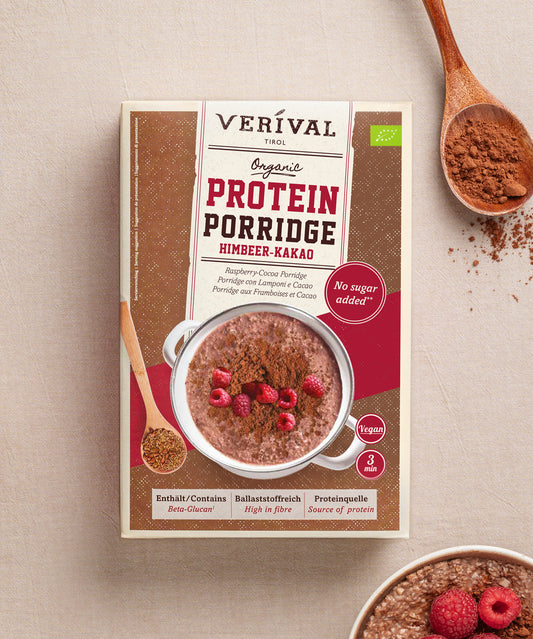A bloated stomach can be really uncomfortable. You feel bloated, heavy and sometimes there is even uncomfortable pressure in the abdominal area. The good news is that with the right diet and a few simple tricks, you can get your bloated belly under control. In this blog post, we'll explain how a bloated belly develops, which foods you're better off avoiding and how you can use nutrition tips and delicious recipes to get relief.
Discover Low Carb Verival breakfast here!
How does a bloated belly develop?
A bloated belly develops when too much air or gas collects in the gastrointestinal tract. This can have various causes, from nutritional errors to physical processes.
Swallowing air and digestive processes
When eating and drinking, you inevitably swallow air. Chewing gum, eating hastily or drinking carbonated beverages increase this effect. In addition, the intestinal bacteria produce gases during digestion, especially when they break down fiber-rich or hard-to-digest foods.
Intolerances and digestive disorders
Food intolerances such as lactose intolerance or gluten intolerance can lead to bloating. In such cases, undigested food enters the large intestine, where it is fermented by bacteria. The result: gases and an uncomfortable feeling of fullness.
Meteorism – what exactly is it?
Meteorism is the medical term for bloating. It is caused by an increased accumulation of gases in the intestines, which often manifests itself as a bloated stomach.
Causes of meteorism
The main triggers are certain foods, intolerances, stress or disrupted intestinal flora. Hormonal fluctuations, for example during menstruation, can also play a role.
Difference from other digestive problems
Flatulence should not be confused with meteorism. While air often “gets stuck” in the case of meteorism, flatulence is characterized by increased gas discharge. However, both complaints can occur at the same time.
What are the symptoms of meteorism?
A bloated belly manifests itself in different ways. Depending on the cause and severity, the symptoms can vary.
Typical signs
- Visible bloating of the abdomen
- Feeling of pressure or cramps
- Abdominal pain
Accompanying symptoms
A bloated abdomen is often accompanied by other complaints, such as nausea, bloating or heartburn. If the air cannot escape, the discomfort increases. The symptoms can worsen especially after eating or with certain movements.
What is the connection between gut health and bloating?
Healthy gut flora is essential for your digestion and can help to prevent bloating. If your gut flora is out of balance, you may experience digestive problems and increased gas production.
What does healthy gut flora mean?
Your gut is home to trillions of bacteria that work together to ensure smooth digestion. An imbalance, for example due to antibiotics or a one-sided diet, weakens digestion and promotes meteorism.
Stress and gut health
Stress can also affect gut health. When you're under chronic stress, your digestion slows down, which increases gas production. A stressed gut also sends signals to your brain, further increasing discomfort.
Foods to avoid when you have a bloated belly
Some foods cause more intestinal gas than others. Here are some foods to avoid if you want to reduce bloating.
Foods that are hard to digest
- Legumes: beans, lentils and chickpeas contain fiber that is hard to digest.
- Cabbage family: broccoli, cauliflower and Brussels sprouts produce gases when broken down.
- Onions and garlic: their sulphurous compounds promote gas formation.
Sugar and artificial sweeteners
Sugar alcohols such as sorbitol, which are often found in sugar-free chewing gum or sweets, can cause bloating. Fructose, which is found in fruit or industrially produced juices, also causes digestive problems for many people.
High-fat foods
Fat slows down the emptying of the stomach, which can cause gases to accumulate in the digestive tract. It's better to avoid fried foods or fatty snacks.
Fight meteorism with the right diet
The right choice of foods will help you to avoid bloating and relieve your bowels.
Foods that are easy to digest
- Carrots, zucchini and pumpkin: easy to digest and low in fiber.
- Rice and potatoes: bind excess gastric acid and are gentle on the stomach.
- Fish and poultry: lean and easy to digest.
Optimize your fluid intake
Drink enough water or herbal teas such as fennel or chamomile tea. These have a soothing effect on the intestines and reduce gas formation.
7 nutrition tips & 3 recipes to help you with your bloating
In this chapter, we will go into more detail about the best nutrition tips to reduce your bloating. Each tip is easy to implement and will help relieve your gut. You will then find three delicious and simple recipes that are specifically designed to combat meteorism.
1. Eat slowly and mindfully
Eating hastily is one of the main reasons for air collecting in the abdomen. When you eat too fast, you unconsciously swallow a lot of air, which ends up in your digestive tract and causes bloating.
Here's how to do it right
Take at least 20 minutes for each meal.
Chew each bite thoroughly until it is well-crushed.
Put your fork or spoon down repeatedly while eating.
Conscious eating not only improves your digestion, but also helps you to feel fuller faster.
Tip 2: Avoid carbonated drinks
Sparkling water and soft drinks are a common cause of bloating. The carbonic acid produces gases in the gastrointestinal tract that are difficult to get rid of.
What is better for you
Choose still water or herbal teas. Drinks such as fennel, caraway or aniseed tea also help to soothe the intestines. Avoid iced teas or soft drinks with artificial sweeteners, as these can also cause bloating.
Tip 3: Reduce sugar
Refined sugar and fructose are difficult to digest and promote gas formation. There is often more sugar in industrially produced foods than you would think.
What you can do about it
Read the list of ingredients and avoid products with fructose, glucose syrup or sorbitol. Also, reduce the amount of fruits with a high fructose content, such as apples, grapes and pears. Instead, opt for natural alternatives such as stevia or small amounts of honey.
Tip 4: Incorporate probiotics
Probiotics are live microorganisms that help balance your gut flora and reduce gas. They occur naturally in some foods or can be taken as a dietary supplement.
Probiotic-rich foods:
- Plain yoghurt with no added sugar
- Fermented products such as sauerkraut, kimchi or kefir
- Miso and kombucha
- Make sure you consume probiotics regularly to reap the long-term benefits.
Tip 5: Less fiber for sensitive bowels
Fiber is generally healthy, but it can increase bloating in sensitive people. You should enjoy particularly hard-to-digest fiber in legumes and whole grain products in moderation.
This is how it's done!
Peel high-fiber vegetables like carrots and cucumbers.
Cook vegetables thoroughly to make them easier to digest.
Increase the amount of fiber slowly so that your gut can get used to it.
Tip 6: Keep your portion sizes small
Large meals put a strain on your digestive tract and can lead to bloating. Smaller, regular portions are easier to digest and reduce gas.
How to get started
Eat 4–5 small meals a day instead of 2–3 large ones.
Divide your main meals into smaller portions and eat them over a longer period of time.
Don't drink too much while eating, but rather before or after.
Tip 7: Get moving after eating
A short walk after eating helps your gut to start digestion and reduce gas more quickly. Just a few minutes of movement can make all the difference.
Some ideas for getting more exercise
Go for a 10-minute walk in the fresh air straight after your meal.
Try gentle yoga poses that aid digestion, such as the knee-to-chest pose. Avoid lying down after a meal, as this slows down digestion.
3 recipes for combating bloating
Recipe 1: fennel and carrot soup
This soup is not only easy on the stomach, but also a delight on cold days. Fennel has an antispasmodic effect and reduces bloating, while carrots soothe the intestines.
Ingredients:
1 fennel bulb
3 carrots
1 medium potato
500 ml vegetable broth
1 tsp. caraway seeds
1 tbsp. olive oil
Preparation:
Cut the fennel, carrots and potatoes into small pieces.
Heat the olive oil in a saucepan and fry the vegetables briefly.
Add the vegetable broth and simmer for 20 minutes.
Use a hand blender to puree the soup and season with caraway seeds.
Recipe 2: Mild millet porridge
Millet is gluten-free, easy to digest and a good base for a filling and bloat-free breakfast.
Ingredients:
50 g millet
200 ml almond milk
1 tsp cinnamon
1 tsp honey (optional)
Preparation:
Thoroughly wash the millet and place in a saucepan with the almond milk.
Bring to the boil, stirring constantly, and simmer for 10–15 minutes until the millet is soft.
Add cinnamon and honey to taste.
Recipe 3: Steamed courgettes with rice
A light dish that is easy on the stomach and filling. Courgettes are very easy to digest and ideal for bloated bellies.
Ingredients:
1 zucchini
100 g basmati rice
1 tsp olive oil
1 squeeze of lemon juice
Preparation:
Cook the rice according to the instructions on the packet.
Slice the zucchini and steam it in a steamer or pot.
Dress the vegetables with olive oil and lemon juice and serve with the rice.
These nutrition tips and recipes offer you simple and effective approaches to reducing bloating. Try them out and see which combination works best for you!
The health risks of meteorism
While occasional bloating is usually harmless, chronic symptoms can indicate serious underlying issues.
Possible complications
- Chronic intestinal diseases: Bloating can be a symptom of irritable bowel syndrome, Crohn's disease or ulcerative colitis.
- Inflammation: a permanently stressed bowel increases the risk of inflammation.
When to see a doctor
If bloating is accompanied by severe pain, blood in the stool or weight loss, you should have the cause medically clarified.
Discover Verival Overnight Oats here!
Conclusion
A bloated belly is unpleasant, but with the right diet and a few small adjustments to your daily routine, you can avoid it. Avoid bloating-inducing foods, opt for easily digestible alternatives and try out our nutrition tips and recipes. This will help you feel lighter again and your gut will thank you for it. Start today and fight bloating!
























